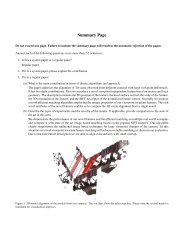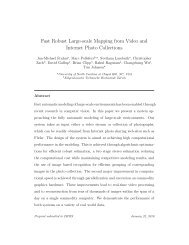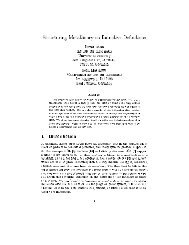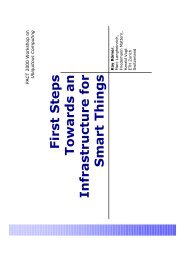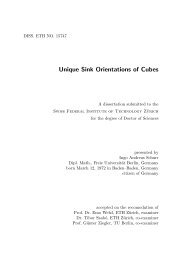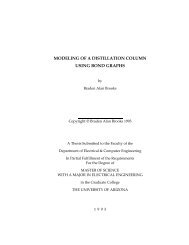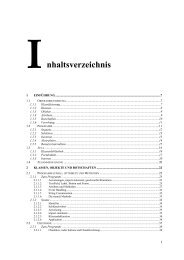A CIL Tutorial - Department of Computer Science - ETH Zürich
A CIL Tutorial - Department of Computer Science - ETH Zürich
A CIL Tutorial - Department of Computer Science - ETH Zürich
You also want an ePaper? Increase the reach of your titles
YUMPU automatically turns print PDFs into web optimized ePapers that Google loves.
CHAPTER 0. OVERVIEW AND ORGANIZATION 9<br />
modications to it, and optionally returns a result up to the caller in main.ml. We include this<br />
source le in the build by adding it to the list <strong>CIL</strong>TUT SRC in CMakeLists.txt.<br />
Functions, like tut0 below, that do this sort <strong>of</strong> work should be called from processOneFile in<br />
main.ml.<br />
0.2 tut0.ml<br />
The rst step in writing an OCaml module that uses the <strong>CIL</strong> library is to open the Cil module (or<br />
bind it to an alias, like we do with the Errormsg module). The CMakeLists.txt le provided with<br />
this tutorial ensures that the <strong>CIL</strong> library is correctly found and linked assuming that it has been<br />
correctly installed. From now on, in the following chapters, the code to open modules and create<br />
aliases will be included only for the rst mention <strong>of</strong> a module.<br />
open Cil (∗ The <strong>CIL</strong> library ∗)<br />
module E = Errormsg (∗ <strong>CIL</strong>'s error message library ∗)<br />
tut0 is a dummy function that doesn't do anything. However, there is certainly nothing preventing<br />
it from inspecting f and making changes to its mutable elds if it really wanted to.<br />
let tut0 (f : file) : unit =<br />
E.log "I'n in tut0 and I could change %s if I wanted to!\n" f.fileName;<br />
()<br />
When the compiler front-end embodied by this tutorial is built and installed, the code in this<br />
module may be run by providing the --enable-tut0 command line switch, like so:<br />
$ ciltutcc --enable-tut0 -o program program.c<br />
I'm in tut0 and I could change program.i if I wanted to!<br />
Finally, if ciltutcc fails due to an unhandled exception, a stack trace may be obtained by<br />
re-executing the command as follows:<br />
OCaml Style Note: Types are inferred, so you don't have to write them<br />
all the time. However, if you want to remember what your code does a month<br />
from now, writing in some <strong>of</strong> the types is a Good Idea.



